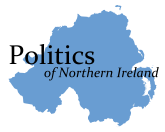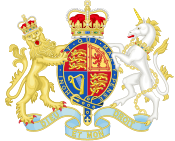- Northern Ireland Civil Service
-
 Logo of the Northern Ireland Executive
Logo of the Northern Ireland ExecutiveNorthern Ireland 
This article is part of the series:
Politics and government of
Northern IrelandNorthern Irish LawNI in the UKNI in the EU
United Kingdom 
This article is part of the series:
Politics and government of
the United KingdomGovernment- Sovereign
- Queen Elizabeth II
- The Crown
- Royal Prerogative
- Privy Council
- Cabinet
- Her Majesty's Civil Service
Foreign policy
The Northern Ireland Civil Service (NICS) is the permanent bureaucracy of Crown employees that supports the Northern Ireland Executive, the devolved government of Northern Ireland.
The NICS is one of three civil services in the United Kingdom, the others being the Home Civil Service and the HM Diplomatic Service. The heads of these services are members of the Permanent Secretaries Management Group.[1][2]
Contents
History
1921-1972
Northern Ireland was established by the Government of Ireland Act 1920 and the first devolved Parliament of Northern Ireland took office on 7 June 1921. The departments of the Northern Ireland Government were initially:
- Department of the Prime Minister
- Ministry of Agriculture
- Ministry of Commerce
- Ministry of Education
- Ministry of Finance
- Ministry of Home Affairs
- Ministry of Labour
An additional Ministry of Health and Local Govenment was formed in 1944, in preparation for the National Health Service and other aspects of the welfare state. In 1965, that department was split between the Ministry of Health and Social Services and the Ministry of Development.
1972-1999
The Parliament of Northern Ireland was dissolved on 30 March 1972, when direct rule was imposed by the United Kingdom Government. The Secretary of State for Northern Ireland assumed responsibility for government and was assisted by a new Northern Ireland Office. The NIO absorbed the Ministry of Home Affairs and took direct responsibility for security, justice and constitutional policy.
Following the Sunningdale Agreement, a power-sharing Northern Ireland Executive briefly held office between 1 January 1974 and 28 May 1974. The following departments were accountable to the Executive:
-
This list is incomplete; you can help by expanding it.
- Department of Agriculture
- Department of Commerce
- Department of Education
- Department of the Environment
- Department of Finance
- Department of Health and Social Services
- Department of Housing, Local Government and Planning
- Office of Law Reform
The Executive collapsed due to the loyalist Ulster Workers' Council Strike and direct rule resumed. The Troubles continued in the absence of a political settlement.
Between May 1974 and December 1999, departments were led politically by junior ministers in the Northern Ireland Office. UK Governments alternated between the Conservative and Labour parties, neither of which included Members of Parliament from Northern Ireland. The Northern Ireland Civil Service, uniquely in the British Isles and Western Europe, was not accountable to locally elected political representatives during this time.
From 1982 to 1999, there were six departments: [3] [4]
- Department of Agriculture
- Department of Economic Development
- Department of Education
- Department of the Environment
- Department of Finance and Personnel
- Department of Health and Social Services
1999 onwards
The Good Friday Agreement (April 1998) led to the formation of the Northern Ireland Executive on 2 December 1999, which ended 25 years of direct rule. The Executive was suspended several times due to political disputes (notably from October 2002 to May 2007) and each suspension resulted in the return of direct rule. Devolution was restored on 8 May 2007 and has continued without interruption since then.
Devolution resulted in an increase in the number of Civil Service departments, accountable to a cross-community Executive of 11 ministers. The Executive initially had 10 departments: [5]
- Office of the First Minister and deputy First Minister (two ministers acting jointly)
- Department of Agriculture and Rural Development
- Department of Culture, Arts and Leisure
- Department of Education
- Department of Enterprise, Trade and Investment
- Department of the Environment
- Department of Finance and Personnel
- Department of Health, Social Services and Public Safety
- Department of Higher and Further Education, Training and Employment (later renamed Department for Employment and Learning)
- Department for Regional Development
- Department for Social Development
The number of departments increased to 11 (and ministers to 12) when the Department of Justice was created on 12 April 2010. The Northern Ireland Office continues in operation, representing the interests of the United Kingdom Government in Northern Ireland.
Composition
As of June 2011, the Northern Ireland Civil Service employed 26,889 staff (out of a total public sector employment of 218,577). The breakdown by department was as follows:[6]
Department Employment Office of the First and Deputy First Minister 384 Department of Agriculture and Rural Development 3,842 Department for Culture, Arts and Leisure 274 Department of Education 613 Department for Employment and Learning 2,109 Department of Enterprise, Trade and Investment 583 Department of the Environment 2,683 Department of Finance and Personnel 3,589 Department of Health, Social Services and Public Safety 732 Department of Justice 1,633 Department for Regional Development 2,413 Department for Social Development 7,458 Public Prosecution Service (non-ministerial) 576 Northern Ireland Civil Service 26,889 Other major public sector employers included National Health Service trusts (68,263), schools, colleges and education and library boards (65,514), local government (12,134) and the Police Service of Northern Ireland (10,542). The public sector constituted 31.3% of the region's workforce.[7]
Permanent Secretaries Management Group (PSMG)
The PSMG is in charge of both the Northern Ireland Civil Service and Her Majesty's Civil Service. The group is chaired by Head of the Home Civil Service[8], the Head of the Northern Ireland Civil Service and the Head of the Diplomatic Service. The group also consists of all first permanent secretaries and other selected permanent secretaries and directors general.
Civil Service Commissioners for Northern Ireland
The Civil Service Commissioners for Northern Ireland are not civil servants and are independent of the Executive. Their main functions are the same as the Civil Service Commissioners of Her Majesty's Home Civil Service.
Organisation
The Northern Ireland Civil Service is staffed by "officers" at the grades listed below
- Support Band Grade 2 - job roles involve mainly manual handling or routine security tasks
- Support Band Grade 1 - job roles involve mainly manual handling or routine security tasks
- Administrative Assistant - generally but not exclusively a clerical role
- Administrative Officer - again a mainly clerical role but with more authority, normally in the guise of financial responsibilities
- Executive Officer Grade I & II - the lowest level of the NICS to which management duties are entrusted.
- Staff Officer - Staff Officers in the NICS are usually regarded as middle management but are also entrusted with project management responsibilities, area management and programme delivery.
- Deputy Principal - acts as an intermediatary grade between SO and Grade 7
- Grade 7 - The highest grade within the Northern Ireland Civil Service. Civil Servants above this grade are not regarded as part of the NICS. Grade
Grades from Administrative Assistant upwards have comparative/analogous grading on Professional and Technical scales and also Scientific scales. The EO1 grade being equivalent to Professional and Technical Officer and Scientific Officer.
References
- ^ "Membership of the Permanent Secretaries Management Group". UK Government. http://www.civilservice.gov.uk/about/structure/psmg/members.asp.
- ^ "Sir Peter Ricketts, Permanent Under Secretary, Foreign and Commonwealth Office". UK Government,. http://www.civilservice.gov.uk/about/structure/PSMG/peter_ricketts.asp.
- ^ Departments (Northern Ireland) Order 1982
- ^ Departments (No. 2) (Northern Ireland) Order 1982
- ^ Schedule 1, Departments (Northern Ireland) Order 1999
- ^ "NI Employee Jobs - Public Sector - December 2007 - June 2011". Northern Ireland Quarterly Employment Survey Historical Data. Department of Enterprise, Trade and Investment. http://www.detini.gov.uk/jun_11_table_5.14.xls. Retrieved 15 November 2011.
- ^ "NI Public Sector Jobs (Unadjusted) - June 2011". Public-Private Sector Tables. Department of Enterprise, Trade and Investment. http://www.detini.gov.uk/jun_11_table_5.9-2.xls. Retrieved 15 November 2011.
- ^ "Sir Gus O'Donnell, Cabinet Secretary and Head of the Home Civil Service". UK Government. http://www.civilservice.gov.uk/about/leads/Gus/index.aspx.
Categories:- Northern Ireland Executive
- Civil Service of the United Kingdom
- Sovereign
Wikimedia Foundation. 2010.
